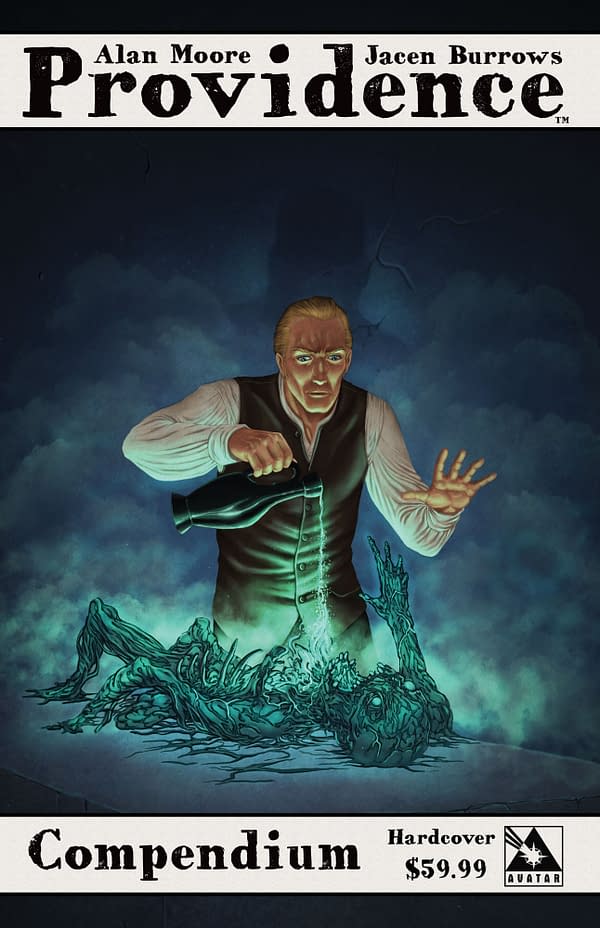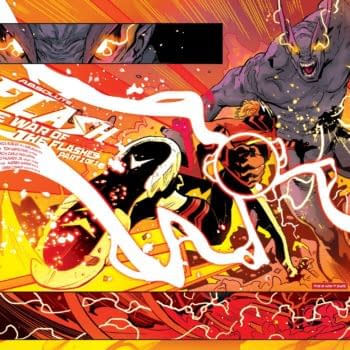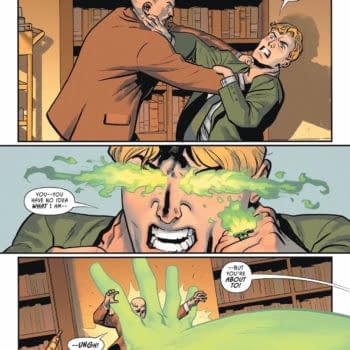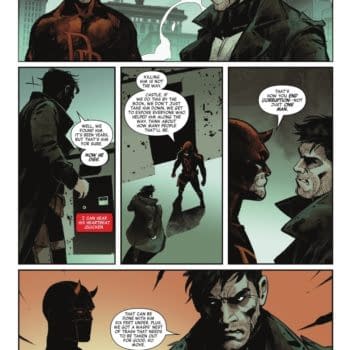Posted in: Comics, Comics Publishers | Tagged: Alan Moore, avatar press, collected edtion, cosmic horror, gnosticism, H.P. Lovecraft, horror, jacen burrows, Lovecraft Country, providence
Providence: A Look Back at Alan Moore's Ultimate Lovecraft Story
Avatar Press owns Bleeding Cool, and as they launched a Kickstarter to publish the single collection of Alan Moore's Providence, I was asked to review Providence now that time has passed since its initial publication since so few reviews were ever published. I didn't need an excuse to read it again, but it's always fun to write about it.
[Editorial Disclaimer: As previously stated, Avatar Press owns Bleeding Cool, but Avatar Press has had no impact or influence on this article's content.]

Providence is one of Alan Moore's most ambitious final projects, a "Watchmen of Horror", as it were. By that, he meant a full-on deconstruction and metacommentary on the entirety of Lovecraft's body or work and the subtexts of racism, gynophobia and paranoia. It's like a kind of Unified Theory of Lovecraft Stories. And the incomparable Jacen Burrows' precise line art charts all the creepy horror and crawling chaos with unflinching exactness
In 1919, journalist and aspiring novelist Robert Black sets out on a journey to do research for a book. Along the way, he encounters aberration, hauntings, horror, mysteries, hints of a supernatural conspiracy spanning centuries, all without realizing their true implications. Little does he know what he's going to encounter or the impact his writings will end up having on the world in the decades to come.
All of Lovecraft is Here, Even Lovecraft Himself
The characters Black encounters are all from Lovecraft's stories, on the cusp of the incidents described in the stories they appear in. Those stories are what H.P. Lovecraft's reputation. Moore posits the idea that all of Lovecraft's stories occur in the same world, the same universe. Black is a gay man who has to keep it a secret and becomes the heart of the story's Gnosticism. Lovecraft's entire philosophy is Gnostic in nature. His stories are about the real secrets lurking in the shadows of the world, threatening to creep out and overwhelm everything. It's a world that doesn't know it's doomed as the Elder Ones prepare to return and take over Reality, and Humanity will be trampled in its monstrous, indifferent wake. You don't need to have read the original stories to appreciate this. Still, you'll find the experience of Providence much more rewarding if you're aware of those stories and the writers and real-life history that swirl around them. Lovecraft shows up as a character in Providence. He only thought he was thinking up the stories he wrote. The story poses the question: what if all of Lovecraft's stories are real? Why did his writing them matter?
Alan Moore's Showcase of True Horror
Providence is a meditation on what true Horror is, not just jump-scares for fun. There are no jump-scares here, only an insidious reconfiguration of reality and how it will make the reader question reality after they finish reading. Reading the story at once instead of waiting for a new chapter every month is a more complete experience. Events and details that are introduced or foreshadowed early on become more apparent when they're paid off later.
Alan Moore believes that Horror is a philosophy and a worldview, not an amusement park or funhouse for safe scares. Lovecraftian horror has always been about helplessness in the wake of vast cosmic horror and loss of control. Hollywood Horror is about jump scares and gaining control to defeat the monster. HBO's Lovecraft Country is about African-Americans reclaiming agency and their own humanity and story, flaws and all, in horror storytelling.
Hollywood storytelling insists on not losing control. Hollywood's escapist storytelling model has always been about getting control and winning. Losing control is Hollywood's biggest fear. You could say that's America greatest fear in general, hence the insistence on hope and optimism. Europe is more fatalistic, even passive, especially the British. Providence is about acceptance of failure, of impotence, of helplessness, of submission to doom. That is true horror.
For Alan Moore, stories are Magick. Stories are a spell. They can alter reality. They can change how we perceive reality. Providence is a spell designed to make the reader question reality and how dangerous stories and dreams – the same thing when you think about it – can be. Alan Moore has retired from comics. Providence may be his last and biggest spell.














